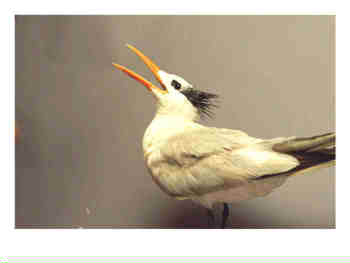Please Help Pets with a Small Donation of One Dollar
Terns are slender shorebirds having long narrow wings,
forked tails and pointed bills.
Most terns are white, gray, and black; some species have brightly
colored bills and feet.
They have short legs and range in length from 8 to 20 inches.
The largest, the Caspian tern, is 20 inches long and has a wingspan
of 53 inches. The smallest is the least tern, which is 8 inches long
and has a wingspan of 20 inches.
They are found around the world, the majority of them in tropical and
subtropical regions.
Many migrate long distances; the best known is the arctic tern,
which nests in the far north and migrates to the Antarctic region
in the autumn.
Most terns inhabit ocean coasts, where they feed on fish and small
marine invertebrates. Forster's tern nests in prairie marshes as
well as on coasts.
Most terns nest on the ground in dense colonies in open areas such
as beach or tundra; nests vary from a simple depression to an
elaborate structure of twigs, grass, and bits of shell.
Terns are long-lived. Individuals continuing to breed at well over 20
years of age have been documented in several species. Most do not
breed until they are three years old, although they may return to
their natal colonies earlier.
Picture Tern

Terns belong to the subfamily Sterninae in the family Laridae, order
Charadriiformes.
Types of North American Terns:
Aleutian Tern
Artic Tern
Black Tern
Black Noddy
Bridled Tern
Brown Tern
Caspian Tern
Common Tern
Elegant Tern
Forster's Tern
Gull Billed Tern
Least Tern
Roseate Tern
Royal Tern
Sandwich Tern
Sooty Tern
North American Birds